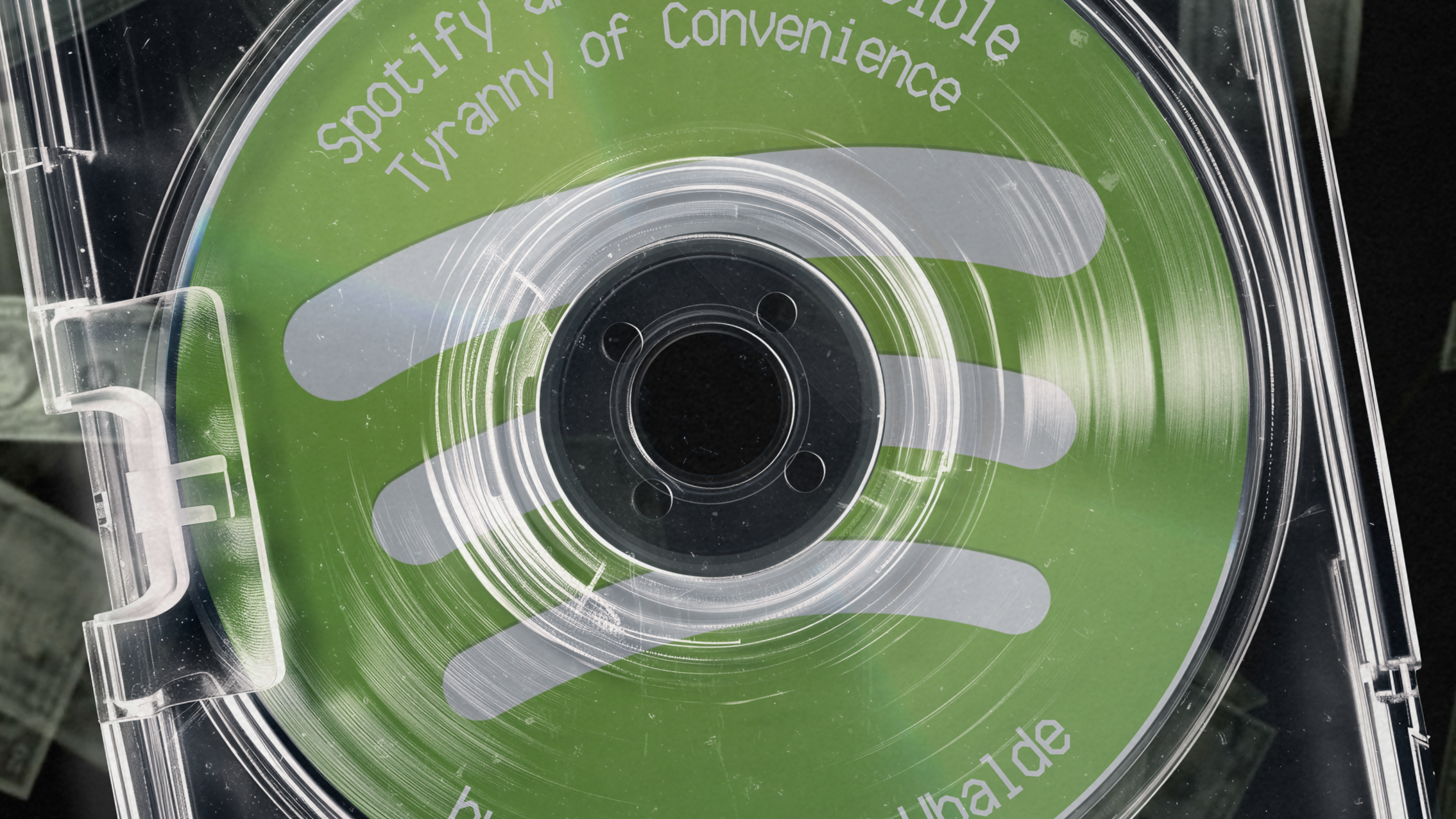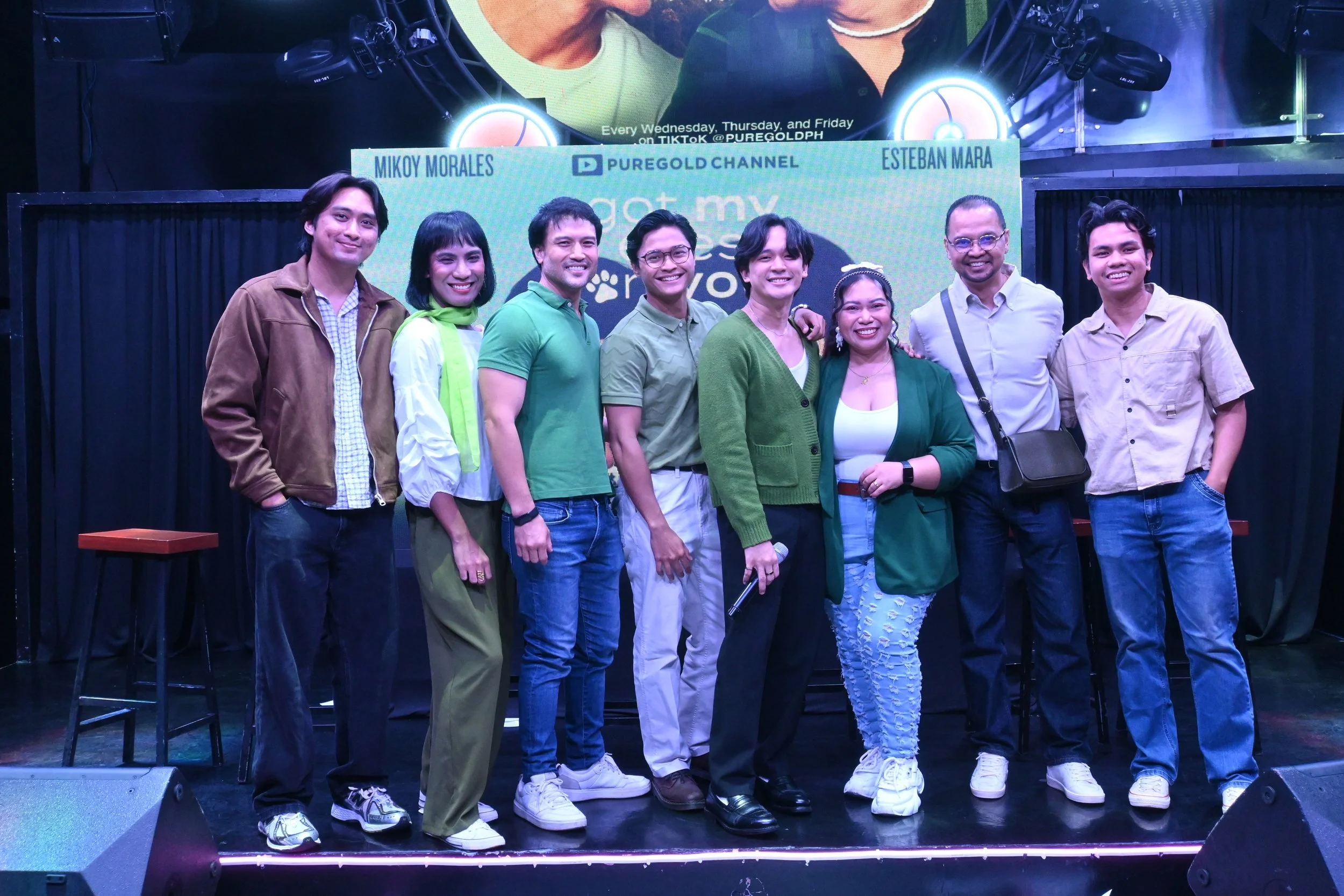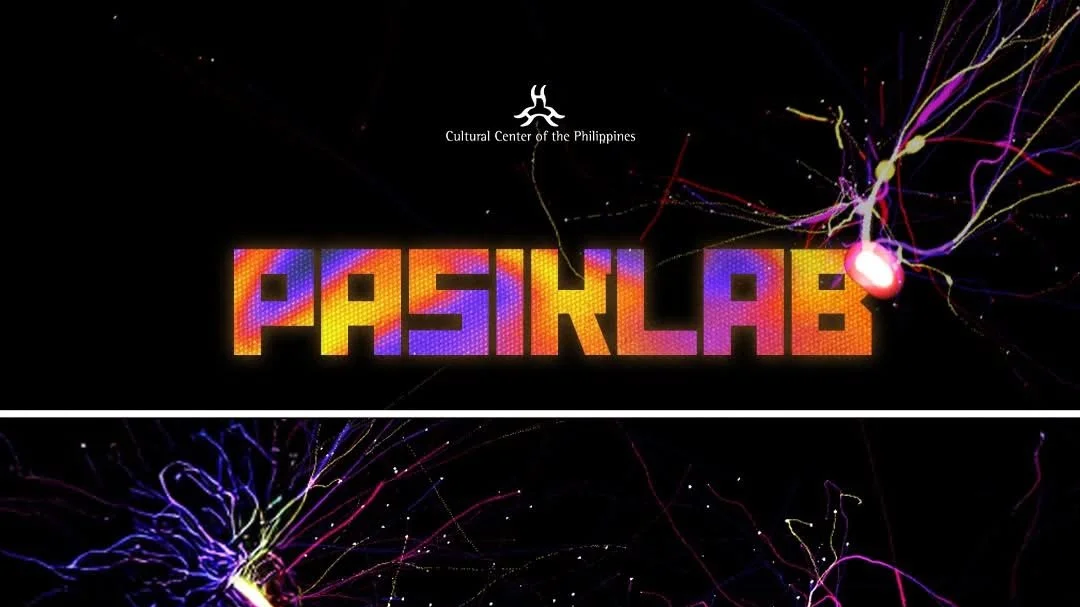Spotify and the Invisible Tyranny of Convenience
Spotify and the Invisible Tyranny of Convenience
Feature art by Arri Salvador
As if lazy, AI-generated sludge and unfair artist payouts weren’t enough, Spotify CEO Daniel Ek has recently doubled down on profiting from a facade of forward-thinking culture and fairness, this time with a $694 million investment in A.I. military tech. It’s a figure that easily dwarfs what the platform pays the very artists who make it worth using, especially independent ones. It's like dragging sandpaper across a wound when you consider that the streaming giant has long insisted on an unsustainable royalty system which does not benefit the artists, even as subscription prices continue to rise.
The growing tension has always been hard to ignore, but now it’s become even harder to briskly scroll past, as more and more underground veteran artists like Deerhoof and Xiu Xiu remove their catalogs from Spotify as acts of boycott. Music is more than just access, and while streaming platforms offer an undeniable edge in convenience and a low-effort hotspot of music discovery, that convenience often comes at the cost of something far deeper and harder to weed out in the long term.
This isn’t a moral failing of users. If anything, it’s a sign of how deeply the platform has integrated itself into our lives. And the idea of it gradually becoming truer by the day makes big tech companies salivate.
Beneath those seemingly benign playlists and recommendations we use on the daily lies a system that undercompensates artists, floods the interface with algorithmic junk food, and most depressingly, strips music of its essence. Worse, it tacitly reinforces a tech ecosystem where profit is placed into amoral ventures (e.g. military-grade A.I.) all in service of one businessman who laid off 17 percent of his workforce and chairs a European enterprise supporting the arms race.
Spotify doesn’t just fail artists and workers; it actively sustains an increasingly hostile future, one that is detached from the values music is meant to uphold and funded by fans of the art form who often have no idea what they’re supporting beyond convenient access to new albums, buzzed-about debuts, and algorithm-sweetened trends.
In our current climate, it’s hard to believe but it wasn’t always this way.
There was a time when listening to music meant ownership, conscious choices, and knickknacks of fun hassle. I still remember the slow, stockpiled anticipation as my father bought albums on his laptop through iTunes, then transferred them to his blue iPod Shuffle. Or how my mother would slide her Carpenters CDs into a sleek stereo system, adorned with stickers, once a marker of stylishness, now kitschy reminders of another era.
The rise of streaming marked an exponential shift, from physical media to digital leasing, from active discovery to automated curation. Spotify didn’t invent this trajectory, but it streamlined and scaled it to near ubiquity. At best, it democratized access, helped artists find global audiences, and gave listeners unprecedented range in just a few swipes. I’ve personally discovered artists who have shaped who I am today through this process. But the opportunity costs remained; it didn’t just erase much of the texture and context once embedded in the act of listening but also developed into a cesspool of business tradeoffs.
The move from liner notes to metadata wasn’t just cosmetic. It signaled an advantageous way for tech giants. What was once tangible and expressive became compressed into cold data fields. In optimizing for convenience, Spotify allowed profit and platform logic to dislodge artistry as advertisement ideas, reducing music to elevator noise and discovery to a numbers game. Most damning of all, it has allowed generative A.I. music to occupy space.
With the latest news of an AI band called Velvet Sundown amassing over one million Spotify streams despite having no human members and no real artistic voice, this paints a troubling picture of how effortlessly algorithms can manipulate the rear view and elevate synthetic content over authentic expression.
Meanwhile, most independent artists struggle to break even 100,000 streams. With Spotify’s average payout hovering between $0.003 and $0.005 per stream, many only see a few dollars, or mere hundreds of pesos in the Philippine context which is hardly enough to sustain a creative career. And that’s without even factoring in the socioeconomic disparities and barriers.
If even a fraction of the algorithmic visibility handed to AI projects were instead directed toward real, independent creators, it could help realign the scales of presence and value with returns that go beyond financially, but in cultural relevance, community support, and the creative sustainability of voices that refuse the easy sidestep.
The infrastructure Spotify is built on is hard to evade. It’s so omnipresent, so fluid, that resisting it feels like swimming upstream. In a culture where algorithmic convenience is framed as the gloss of modern novelty, we’ve gradually welcomed how this phenomenon can rewire how we listen, consume media and even think.
These systems, once pitched as liberating tools of access, are now harvested as training data for machine learning models, building profit pipelines for tech oligarchs while subtly shaping public perspective. Layer in a media ecosystem obsessed with passive consumption and short-form content, and the line of movement becomes not just worrying, but at odds with the intent it promised to the masses.
There’s a psychological cost too. In this dopamine-chasing feedback loop, discovery becomes disposable and content becomes mindlessly scrollable, dulling both attention and urgency, and not to mention how the sheer volume of choice can erode intention. We lose more than the ritual of listening, the memory of hearing something for the first time and holding onto it. We lose autonomy.
But it doesn't take long to notice that the lizard’s tail is still twitching. As these fractures accumulate, more people are becoming wary.
A growing collective consciousness is beginning to recognize how internet use — once a tool for empowerment — is becoming an unregulated detriment. And instead of looking away, many are using these same platforms to raise awareness. It’s not uncommon now to find TikToks and reels championing the return to analog, the tactile draw of CDs, vinyl, or cassettes and rows of books on a shelf. These aren’t just trends; they’re symptoms of a cultural self-correction.
Nostalgia plays a part, yes. But I believe this shift reflects something more meaningful than romantic idealism: it’s a widespread reckoning. Ever since the rise of social media, we’ve been trapped in dopamine loops engineered by convenience. We’ve been chewing the same piece of gum for too long, the flavor’s gone stale, and now our jaws are tight locked. We are beginning to recognize the emotional and cognitive cost of outsourcing attention, discovery, and ownership to systems that don’t have the tiniest care about any of it.
Relearning the small, observable hassles in physical media — the clack of a jewel case, the few seconds it takes for a player to spin up — may be among the few tangible forms of resistance we have. Against a world always in flux, where algorithms dictate our tastes, make up most of our daily routines and tech oligarchs exploit our every scroll, these moments of deliberate engagement stand as little acts of defiance.
And resistance is more than necessary. Because Spotify, like so many swaths of tech giants entering day in and out, has quietly repackaged capitalism in sleeker, more family-friendly, more personalized flairs, but it’s no less insidious. And in such cases, choosing a little inconvenience is the only way to claw back our attention, and the agency we've been conditioned to neglect.
There are alternatives. Bandcamp remains one of the few platforms where artists see real revenue. Buying direct from artist websites, local shops or independent labels helps too. Even organizing a CD swap, building a personal and curated archive, or simply recommending a favorite album in person or in online forums. These are slow, imperfect but deeply human responses to a system built on extraction.
To buy physically is not only to own something, but to directly support the artists unlike streaming, which obscures support behind a flaccid wall of fractions and false promises. Physical media doesn’t just deliver sound; it delivers real ownership, autonomy, and an honest transaction in an ecosystem built on exploitation from the startup.
Music is not a commodity, no art form is. Songs are not just a byte-sized file or a feed. It’s a contained story and a time measured in specific moments of people and place. And in choosing the inconvenient, the deliberate act of listening outside the grip of the algorithm, we don’t just reclaim the music, we reroute easy rewards and prevent greedy businessmen from investing in their pathetic toys. What was once a casualty of convenience can become the very ground on which we resist and reclaim ourselves.


















